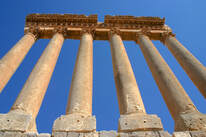weekly column
|
Each week, find a commentary on something connected to verses of Torah or another source of wisdom
|
|
Each week, find a commentary on something connected to verses of Torah or another source of wisdom
|
 The Last of Deuteronomy or erect a stone pillar, for such the Lord your God detests. Deuteronomy 16:22 A very long time ago (in my life, that is), I was a student in a pristine building that was the newest iteration of a venerated educational institution. The setting was magnificent, the facilities modern, the change from the previous location breathtaking. Unsurprisingly, about five months into the academic year, a dedication for the campus was scheduled. Suddenly, plaques started showing up everywhere. Large brass signs were installed on expanses of wall. Letters paying tribute to donors were affixed above doorways and walkways. Smaller signage appeared near windows and on furniture. I was offended, as only a young and self-confident man could be, that with all the learning and teaching and good works going on in this new building, it was people with money who were going to be honored. I was pretty vocal about it to the administration, and the president of the university, who was also one of my professors, actually devoted a day of class to discussing the concern. He made no attempt to defend the practice of naming structures for generous donors; he acknowledged it as a convention and something necessary to secure the kind of capital funding needed to create the space for learning. Instead, he talked about the donors themselves. He wanted us to know who they were – people he had gotten to know when he was younger and they were poorer, and what the values were that they embraced before they had money to put where their mouths were. I can acknowledge all these years later what my prejudices were about rich people (not many of whom I actually knew), which was a reflection of my attitudes about money in general when I didn’t have any. But the lesson of that day, and of my experiences over the longer haul, is that being rich doesn’t make you a person undeserving of recognition. A few years later, in a different city, I had a conversation with a retired New York City social worker. I asked him about the lessons he learned about people in his job. He responded that the most important thing he learned was the truth of what his own father had told him as he began his career – but that he did not want to believe. It was this: just because you are poor does not mean you are a good person. The lesson I took from that pair of experiences is that money has nothing to do with character. Like every other measurable commodity in life, it is what you do with what you have that is an indication of your values. If you project your personal worth onto your net worth, any correlation will be accidental. Putting your own name on a building (as opposed to honoring someone’s finer qualities with a tribute to their acts or generosity) is most certainly a matter of ego. It has never been an option for me, so I cannot represent the thought process that goes into a decision to slap my name on brick and mortar, but I do believe there is a sense that, by doing so, a permanence of some kind is secured. We know that’s not true, of course. Buildings rise and fall, and lately even monuments seem to have an expiration date. But investing a sense of recognition, power and longevity in construction is an old mistake. To use an old pun, call it the edifice complex. I get it, I must say. Stones seem to have more permanence that lives. They have been around longer, generally resist deterioration and have “witnessed” the rise and fall of circumstances and even civilizations. Among those fallen civilizations were those that attributed such longevity to a corresponding divinity. Stone pillars, assembled from raw materials or carved into likenesses, were fetishistic representations of pagan gods. The Bible’s innovation – a deity without a (permanent) physical manifestation – stands against the inclination to make the false equivalency between spiritual permanence and physical permanence. Likewise, human beings who feel powerless may very well turn to the relative impenetrability of a solid structure. After all, a rock feels no pain. But in the end, relying on such a structure is hollow trust. Putting up a building, erecting a monument to yourself, constructing a wall to make a case for your own greatness – all of those things are insights not into wealth, but into personal poverty. It’s easy to see why it makes someone detestable.
0 Comments
Leave a Reply. |
Archives
October 2023
Categories |